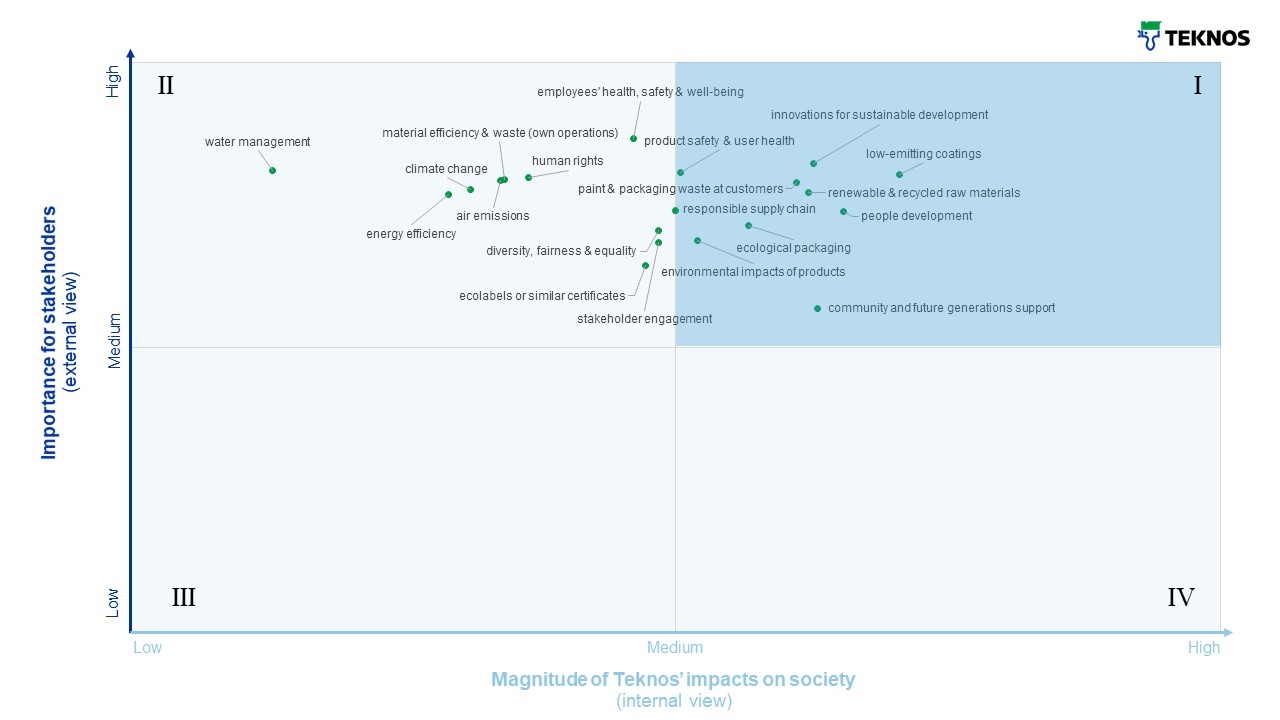Materiality assessment
The expectations of stakeholders and our impacts on society play a crucial part in determining sustainability priorities at Teknos. We periodically consult our key stakeholders to assess the materiality of various environmental, social and economic topics to our business.
A topic is material to Teknos when it meets two criteria. First, Teknos has or can make a significant impact on the topic for society. Second, it is important to our stakeholders.
The first materiality assessment was done in 2018 by collecting inputs from over 130 Teknos employees. The identified material topics formed the Teknos Corporate Social Responsibility (CSR) Program.
The latest materiality assessment was conducted during 2019-2020 with over 250 internal and external stakeholders. The assessment was evolved to follow the GRI Standards and the EU Guidelines on non-financial reporting. Ten material topics were identified as the result of this assessment.
Teknos materiality matrix (as assessed in 2019/20)
20 sustainability topics were ranked across two dimensions of a materiality matrix:
- the X axis represents our internal perspective on the magnitude of our impacts on society;
- the Y axis represents the importance of the topics from the viewpoint of our external stakeholders.
The materiality assessment process
The process started with a screening of sustainability frameworks and publications to identify a range of sustainability issues. The chosen sources were:
- the UN Global Compact
- the EU Guidelines on non-financial reporting
- the Polaris Impact Assessment of the Family Business Network
- Cefic’s Responsible Care management framework
- the Finnish Responsible Care sustainability program
- GRI’s study publication: Sustainability topics for Chemicals sector
- the EcoVadis CSR assessment
The most mentioned issues were selected and grouped into 20 topics.
Internally, we assessed the magnitude of our impacts on society concering those topics through workshops and an online survey. The participants were management teams on the Group and country levels and core experts.
Externally, we asked our key customers and suppliers globally via an online survey to rate the importance of each topic. Additionally, we conducted four sustainability-focused interviews with selected customers.
Altogether 252 responses were collected from internal (50%) and external (50%) stakeholders.
Defining priorities
The topics were plotted in the materiality matrix according to the scores given by the stakeholders. The materiality matrix was validated in an internal workshop with core experts and approved by Teknos' CSR Steering group.
The priority decision is grounded in the stakeholders’ inputs. Teknos will particularly focus on addressing the ten material topics that were rated medium to high in both dimensions of the matrix (the quadrant I).
Some of the material topics are currently addressed in our Corporate Social Responsibility Program and targets. We have also identified gap areas, which are ecological packaging, environmental impacts of Teknos products, and waste generated from the use of our products at customers’ end. We will make a plan during 2020 to better address these topics in the future.
